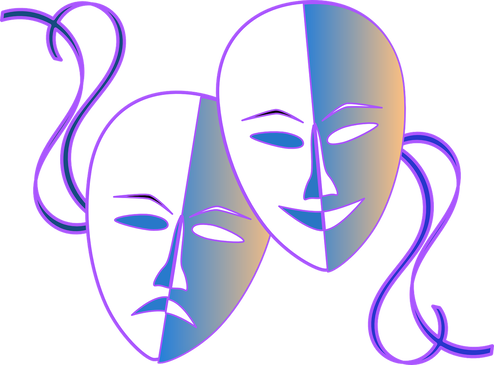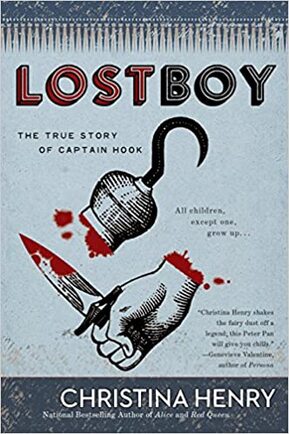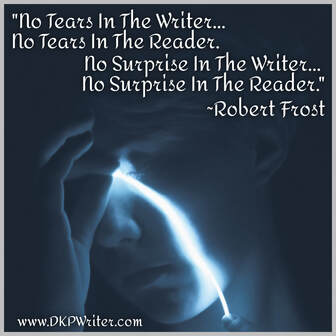 Three times, in as many days, I’ve seen posts in various groups on Facebook asking whether writers work on multiple projects simultaneously, or just one at a time. It’s an interesting question, to be sure. Before I go any further, let me say this… There is no “right” or “wrong” way to do it. Writing is a creative endeavor, and as such, each creator has their own method and strategy. What works for one artist, may not work for another, and that’s perfectly fine. Any way you want to create, I support. Well, except painting or writing with blood… not a big fan of that medium. Okay, disclaimer over… let’s talk about this for a few minutes. My answer to this question is that I write in multiple projects simultaneously. I always have, I probably always will. At any given time, I have between three and five projects in process. Sure, they may all be in various stages of “done” but I’m working them all at the same time. I usually do a little bit on each one over a long period of time, and usually with classical music playing in the background. One project may be in final edit, another may be in rough draft version two, another in rough draft version one, another may be in outline, world building, and character mapping, and yet another might be in synopsis development and story design. You get the idea. There are lots of spinning plates in the air at all times, which I find exhilarating. I’ve tried working on just one project at a time before. I didn’t enjoy it. Here are a few reasons why… When I work on a single project, I find myself getting bored quickly. I have a Gemini brain. No, I’m not a Zodiac person… I don’t put much stock in that stuff, beyond the simple recognition that if we NEED labels, or tidy explanations for how we function in the world, this one fits me. I live in a continuous duality of emotion and thought. (I have one author friend who lovingly refers to me as slightly schizophrenic.) While processing through my day, my brain is nearly always going at full tilt. My imagination is constantly working on at least two different things, while my logical brain is working on strategies for my business and my home life. I find story in pretty much everything I see, feel, and experience… all the time. I don’t do singular focus effectively. I can’t imagine being forced to ignore all those other great ideas bouncing around in my brain while working a single novel. That seems tremendously stifling to me. Writing multiple projects means that “writer’s block” (or as I call it, “writer’s laziness”) has no room in my life. If I get stymied on one project, I can simply move to another. Shift gears, and keep moving. There is no excuse for imagination shut-down in my world. I have too much I want to create to allow for any extensive “down time” while I “regroup” my thoughts. I write because, like breathing, if I don’t do it, I’ll most certainly die. I truly feel that. Nope, creative stagnation doesn’t serve me. Instead of wallowing in the frustration of not working in my project because I can’t think of the next thing… or more likely, Drake (my muse) is being stubborn, I move on to something else, and allow that other frustration to work itself out. Usually, when I return, the problem has been solved, and I’m able to move forward. How do I do this? Well, I’m a Passionate Plotter. I keep outlines and timelines and notes of all sorts to help me remember what a particular group of characters are doing or the places they are going. Okay, the fact that I work in different genres helps tremendously. I don’t have a problem with overlapping characters or storylines because each project I’m working on is very different from the others. Think about all the television shows you watch throughout a week. Each one is different… maybe in the same genre (because humans can be creatures of habit), but each has a different storyline, with different locations and characters. Do you ever get them confused? No? My brain processes writing and books in the same way. I’m also quite good at compartmentalization. I find it easy to tuck details from each story I’m working on into its own little box in my brain, and rarely do they mingle. I also read multiple books for pleasure, and I edit multiple projects for other authors, all while I’m working on my own novels. So, I suppose compartmentalization could be considered my “super power”, if I have one. Reading and editing help with story and character empathy, which makes me a better writer. I don’t think story creation happens in a vacuum. I believe you need exposure to other creative outlets to feed your own voice… whether that’s books, television, film, music, or art… I think it all contributes to making my work better. There has only been one instance where I’ve noticed a comingling of my work, and that was with my romance novel, A Tryst of Fate. For those of you who are interested, the new edition will be available in early January. So, how was this project different? Well, it was almost a deliberate process. At the time I was writing the first draft, I had an idea that I wanted to write a collection of short stories. As I finished the draft, and began editing, I realized that each of the stories had an overlapping theme, and they weren’t truly separate. Drake came up with a great idea to weave them into the larger tapestry of a single novel. So that’s exactly what I did. Sometimes, the Duck comes up with some great ideas. So, the collection of short stories I was working on became the stories that my male lead tells my female lead, as a way to reconnect with her. Each story is a parable of the character’s history together. Then, I sewed them together with an over-arching main plot, and built in transitions specific to that story. It was a fun exercise in quilting a book. The biggest overlap came when one of the short stories migrated into a separate book of its own. I read that particular section to the critique group I was working with at the time, and they suggested that with a little reworking, it could be a stand-alone middle-grade book. So, I did that. It's called The Griffin of Greed. I changed some of the language for a younger audience and wrote a second book, before the romance novel was published. That wasn’t in the original plan, but it worked out. Looking back, I’m happy, that I chose to link the shorts together into a full novel. They are much more vibrant as part of a bigger story, and together, they supported the main plot, as individual subplots. It was a fun writing process. Sorry, I got sidetracked there for a moment. Gemini, remember? Back to the original question. Yes, I think that writing multiple projects, if you can do it comfortably, is a fantastic opportunity to revolutionize your writing practice. It will keep your imagination engaged in the work, and help to eliminate the excuse of laziness by cloaking it in the term, “writer’s block”. For Drake and me, writing many stories at the same time, makes us very happy. Does it take longer to publish writing this way? Yes, definitely, yes. But it’s the method that works for us. It’s how we have the most fun. And if you’re not having fun, what, exactly, is the point? So jump in. Try writing a couple of different stories at the same time. You may just surprise yourself with what the new forks in your creative road reveal to you, your characters, and your readers.
2 Comments
 While I was doing my usual scrolling through posts on Facebook last night, I saw that an author posted an important question in one of the groups. He was excited to share that he received an offer from a small house to publish his book. The author shared with the group the specific royalty splits and asked if the group thought that what he was offered was a "fair contract". I cringed. I understand the excitement and overwhelm involved with the prospect of being rewarded for all your diligent writing work with a “traditional” publishing contract… even one from a small or hybrid publishing company. It’s a big deal. It screams legitimacy to every fiber of our being. A contract reinforces our dreams and places “real world” value on our work. It’s the one thing so many authors hope and pray for… a “real” publishing deal! For authors who prefer this publishing path, receiving an offer on a manuscript is a huge leap forward for their writing career. It SHOULD be exciting. Authors SHOULD celebrate. However, I see far too many authors jumping at these offers without doing their homework first. Many don’t investigate what costs are involved with publishing because they don’t see their writing as a career, but instead, as a hobby. Many authors don’t think about their writing as a business. It makes me sad. It makes me sad to see authors devaluing themselves this way. I think creativity is one of humanity’s most valuable assets, and it’s discouraging to see so many people discount their own contribution. So, not that anybody asked, but here’s my two cents… If you get an offer… first, open the champagne, enjoy the chocolate, and celebrate. Scream happy things from every rooftop you can find. You DESERVE that party! Then, cool your jets just a little bit. Before you sign ANY contract, or even, any print agreement, always have an Intellectual Property Attorney look it over. I know it’s tedious, but it’s important. The language in these documents may influence your writing career for decades and may even impact the works you haven’t written yet. Google “Right of First Refusal in publishing", and you’ll properly scare yourself into doing more research. I know IP Attorneys can be expensive, but I think it’s worth it to protect your copyright, legacy rights, print, and distribution rights. You wouldn’t sign a mortgage, or a car note without first making sure you understood the language and the terms of engagement… don’t neglect this important step with your writing career. Think about this… if the book does really well, and some Hollywood film company wants to make it into a movie or a TV series, you’ll REALLY want to make sure your rights are protected. And yes, I am THAT weirdo who actually READ the terms before I Indie published through Amazon/KDP. If all this seems a little daunting, or too expensive, let me suggest an alternative. There is an organization called The Authors Guild, that works with authors to protect their interests and rights. I first discovered them about ten years ago, when I attended the AWP (Association of Writers & Writing Programs) Conference in Minneapolis. The Authors Guild website states that their mission is "To support working writers. We advocate for the rights of writers by supporting free speech, fair contracts, and copyright. We create community and we fight for a living wage.” Think of The Authors Guild as your “Writer’s Union”. They help with contract understanding, negotiation, and disputes, Media Liability Insurance, and they have a host of other resources that are extremely valuable. They offer At-Large, Student, Emerging Writer, Associate, and Regular Membership levels. Memberships start at $100/year and go to $135/year, depending on your needs and who you are as a writer. Really, $12/month to protect your writing… it sounds like a bargain to me. When you consider all that goes into writing a book… the investment of time, creativity, unique ability, sleepless nights, awkward conversations about imaginary friends with non-writers, never-ending social media engagement… plus the costs of notebooks and a really good pen, or software, heaps of tea, coffee, or cocoa, snacks, editing, interior formatting, cover design, and marketing outreach… I can’t imagine why you would agree to skimp on protecting your rights and future writing career just because you were offered a shiny contract from a publishing house. Don’t let your excitement make decisions for you. You are not a raccoon. Don’t grab the shiny thing until you know for sure that it’s something that will sustain you over the long haul. It you don’t have an IP Attorney, I highly recommend you look into becoming a member of The Authors Guild. It could save your career. No, I don’t get paid for telling you about them. My only goal is to help you protect your books and your career from poachers. Disclaimer: I know that this organization works with United States authors. I don’t know if they work with authors from other countries. But I would imagine it to be a question easily asked, and answered. https://www.authorsguild.org/  I grew up enjoying classic tales. Whether they were Grimm's or Disney, Hans Christian Anderson or Aesop, I've always enjoyed the structure of these stories. Fantastical events, animals brought to life, personification of objects and plants, and magical creatures. Each usually had a lesson or moral at the end... something to remember, something of value. Recently, I discovered Lost Boy by Christina Henry. This is one of my favorite styles to read... an alternative creation myth. Its foundation is based on the original story of Peter Pan, but aside from that reference, this story stands as remarkably different. Leave behind your preconceived childhood notions. This story is told from Hook's raw reality and in his voice, going back to the very beginning. The book is infused with the details of a potential history that was either unrecognized or purposefully ignored in the original. Ultimately, this style of writing could be considered Fan Fiction, with twists that remove us from the original in such a way that it becomes unique. Ms. Henry discovered a story that was neglected deep inside the fairy tale, and gave me the opportunity to stand just a little askew of normal to discover possibilities I hadn't imagined. The book was spectacularly written, and it flowed effortlessly. The author offered a new relationship between Hook and Peter Pan that challenged everything I thought I knew. It was tight, exciting, and unpredictable. The descriptions of the Neverland Island were extremely vivid. Although there was a map in the beginning of the book, I had no use for it once I began reading. It wasn't difficult to drift into that world and find myself standing by, a mere wisp of a witness, as I took in the landscape. The descriptions of trees, swamps, fields, and mountains were perfect, in that I was able to imagine them from my own experience, rather than become hindered by the author's belabored definitions of these spaces. She gave me just enough to place myself, and then she allowed me to fill in the blanks on my own. It takes real talent to flip everything we thought we knew about a place and the characters that live there, and convince us that we'd been mislead all these years. That's exactly what Ms. Henry does with this story. The dialogue between the characters is fresh, spontaneous, and sincere. The conversations were poignant, and laced with levels of innuendo I never thought to ascribe to them. These are people, not characters, and it was refreshing to read them that way. Their motivations and defenses seemed far more three-dimensional, with nuances that reminded me to never negate the other side of the story. This book allowed me to question and re-evaluate everything I thought I knew about Neverland, it's rules for life, the people who live there, and the origins of it's magic. It captivated me, and held me firmly on the edge of my seat, just as the original had as a child. However, understanding this story through the eyes of an adult lends a clarity to the rivalry between Hook and Peter that I had not considered before. That was an interesting surprise. This is a brutal story - both emotionally and physically - certainly not for the faint of heart, and definitely not written for children. It has made me reconsider what it means to grow up, and how impactful our expectations of children can be, long into adulthood. I highly recommend this book. It was a fast read, I finished it in a total of about twelve hours, over four nights. Ms. Henry has written other fairy tale revisions, and I am eager to read them, too.  I've been working on the new edition of my romance novel, A Tryst of Fate, lately. I'm tightening the prose, reformatting the interior, adding to scenes, catching the typos, and designing a new cover. As I’ve done with the others, I’m republishing the old work, under my Pages Promotions imprint… for legacy’s sake, and legal control. Writing is a business, after all, and these things must be considered. As I was working yesterday, I was caught quite by surprise with the strong emotion of one particular chapter... and then a second. Different emotions, both were equally powerful. I think it’s an interesting thing, going back through my work from several years ago. This book was initially published in 2016, so it’s been five years since I’ve actually read the story in it's entirety. Once I finish a book and release it into the wild, I rarely go back to reread it, as a reader might. Usually, I’m focused on the marketing plan, and writing next project. I don’t usually stand back and stare at my work, the way a painter might. Of course, I remember the story, the characters, the plot progression, where the twists are introduced, and how they are resolved… but I forgot about the emotions. I forgot that when I wrote this book, I was drawing on the memories of personal experiences and moments in time… my time. I included many of my own wishes, hopes, dreams, pieces of the people I knew, and the reality of life as I understood it then. I forgot just how powerful it can be when I use those fragments of my own life in my work. Certainly, I do that with every project I write. The book I’m working on now, for instance, which I started in November (my NaNoWriMo project) has tremendous emotion, favorite places, tinges of people I know, and strong memories…but… As an author, when I’m in the middle of creation, I’m living fully in that moment. I don’t always know, cognitively, where I come up with my ideas, or how I fashion my characters. Even as a Passionate Plotter, I can’t always be certain how a particular feeling or movement will show up in my work. Most of the details, I leave up to Drake, and simply allow his intuition to emerge on the page. I try not to interfere too much with that stuff. In several cases, I’ve looked back on my work during the polish phase, and found myself asking, “When did I write that?” Knowing full well, it was the Duck’s intervention, and I had very little to do with it. Then, through the editing, I’m disconnected, looking more for mistakes and making corrections… dissecting it piece by piece, ignoring the forest for the trees. I put a microscope on my work, and fine tune every nuance. I detach. It’s important work. It needs to be done this way, to connect the pieces, and tie up the ends. Continuity conflicts can only be caught in this micro examination of the work, because my brain is so good at mushing everything together the way my teachers taught me to read, filling in the holes automatically. So, I touch through the leaves, one by one, forgetting how majestic the forest can be, when taken acre by acre. Through this process, I sometimes forget the impact my work can have on the reader. Yes, I want to provide them with a great story, an afternoon, or perhaps several afternoons, of wonderment and escape into our imagination, mine and the Duck’s. And yet, I think, sometimes, I forget to revisit that space myself. I’m often so concerned with making sure it’s done right… I forget how right it already is. So, if you find that my next books take a bit longer to release than is “expected” it is because I’m allowing myself to transform back into a reader first. I want to truly absorb my work’s affect to be sure it aligns with my work’s intent. If the story stirs questions, emotions, surprise, and wonder in me… that’s when I know it’ll be ready for readers… and the Duck can move on to the next project. Although, in truth, I have zero control over the little quacker, and that’s not such a bad thing, either. For those who might be wondering… the new edition of A Tryst of Fate should be released by month’s end. I'll post something on social media, when it's available. |
WelcomeYou'll find some interesting stuff here... some Op Eds, some Information, Book Reviews, and More. Poke around the categories and see what ruffles your feathers... in a good way! Archives
July 2024
Categories
All
|
 RSS Feed
RSS Feed